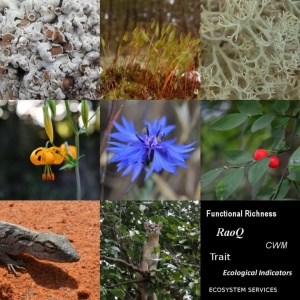Objectives
Under the general framework of Global Change Ecology, the goal of this course is to provide the participants with the most recent and practical knowledge on the use of Functional Diversity. This includes the selection of functional traits and calculation of Functional Diversity Indexes. Examples of the application of this knowledge will be given regarding Ecological Indicators and Ecosystem Services.
The specific objectives are:
- To give a general overview on global change drivers and point out the needs of current and future studies on Ecology
- To synthesize the most useful methods and tools for Ecosystem Services assessment, focusing on Ecological Indicators
- To allow the participants to apply the acquired knowledge on case study data (participants’ data or data provided by the organizers), using R software. Examples of calculation with other software will also be provided (e.g. PC-ORD)
Participants have to be present at 85% of the contact hours (this means that they can miss one half-day), and actively participate in all activities.
This course can have a recognition of 6 ECTs for FCUL PhD students enrolling in it as part of their first doctoral year. These students need to deliver two reports after the course. For students only requiring 5 ECTs recognized in their specific PhD programmes the last 3.5 hours of the course are not mandatory, they need to deliver only the main report and the certificate will be on 'Topics in Hands on Functional Diversity’. Such report(s) are also advised for other students requesting creditation of the course in their institutions.
Minimal formation of students: Bachelor in Biology, Natural Science or related areas
Directed to: MSc or PhD students in Biology, Environmental Sciences, Ecology or related areas, postdocs and professionals working in related topics.
General Plan
PROGRAM
Monday
09:00-09:30 Welcome session and program presentation
09:30-12:30 Ecological Indicators: background
Link to Ecosystem Services
12:30-13:30 Lunch
13:30-17:30 Personal project: presentation
Tuesday
09:00-12:30 Functional Diversity Indices: theory and methods
Database management
12:30-13:30 Lunch
13:30-17:30 Computer Lab – personal project
Wednesday
09:00-12:30 Computer Lab – personal project
12:30-13:30 Lunch
13:30-17:30 Computer Lab – personal project
Thursday
09:00-12.30 Case studies from cE3c
12:30-13:30 Lunch
13:30-17:30 Preparation of presentation of personal project
Friday
09:00-12.30 Personal project: results and discussion
12:30-13:30 Lunch
13:30-17:00 Personal project: results and discussion
17:00-17:30 Closure
Funding
Students fees.
Partners
n.a.
Fee
Free for 1st year PhD students in Doctoral programmes at FCUL (e.g. Biologia), Biodiversity, Genetics and Evolution (BIODIV UL; UP), Biology and Ecology of Global Changes (BEAG UL, UA) and Sustainability Science (UL, several institutions), when the course counts credits for their formation, in which case the delivery of a final report done after the course is mandatory; the course is also free for more advanced PhD students of the BIODIV programme (ULisboa or UPorto); 50 € for more advanced PhD students of cE3c of other programmes; 80 € for PhD students of the PEERS network (CFE); 125 € for FCUL Master students and unemployed; 180 € for BTI, BI and other PhD students; 250 € for Professional and postdocs.
When the maximum number of students is reached, 10 vacancies will be available for non-paying 1st year PhD students mentioned above, being, by order of preference students from: 1) cE3c; 2) BIODIV (not from cE3c); 3) FCUL (not from cE3c); 4) Sustainability Science (not from cE3c or FCUL); 5) BEAG (not from cE3c or FCUL).
Candidates should fill in the following FORMULARY:
(closed)
This formulary is strictly confidential, as explained in the introduction, and the data are required because the cE3c Advanced Courses are also offered as part of the PRR programme of FCUL.
When filling the formulary mind to:
- FILL ALL THE MANDATORY FIELDS
- UPLOAD CV AND MOTIVATION LETTER, both mandatory; use the names as instructed
- If you want to resume later SAVE the formulary, otherwise you will need to fill everything again
- At the end SUBMIT the formulary before exiting
For any doubts please contact the cE3c coordinator of the cE3c courses Margarida Matos, email mmmatos@fc.ul.pt
amanunes@fc.ul.pt

